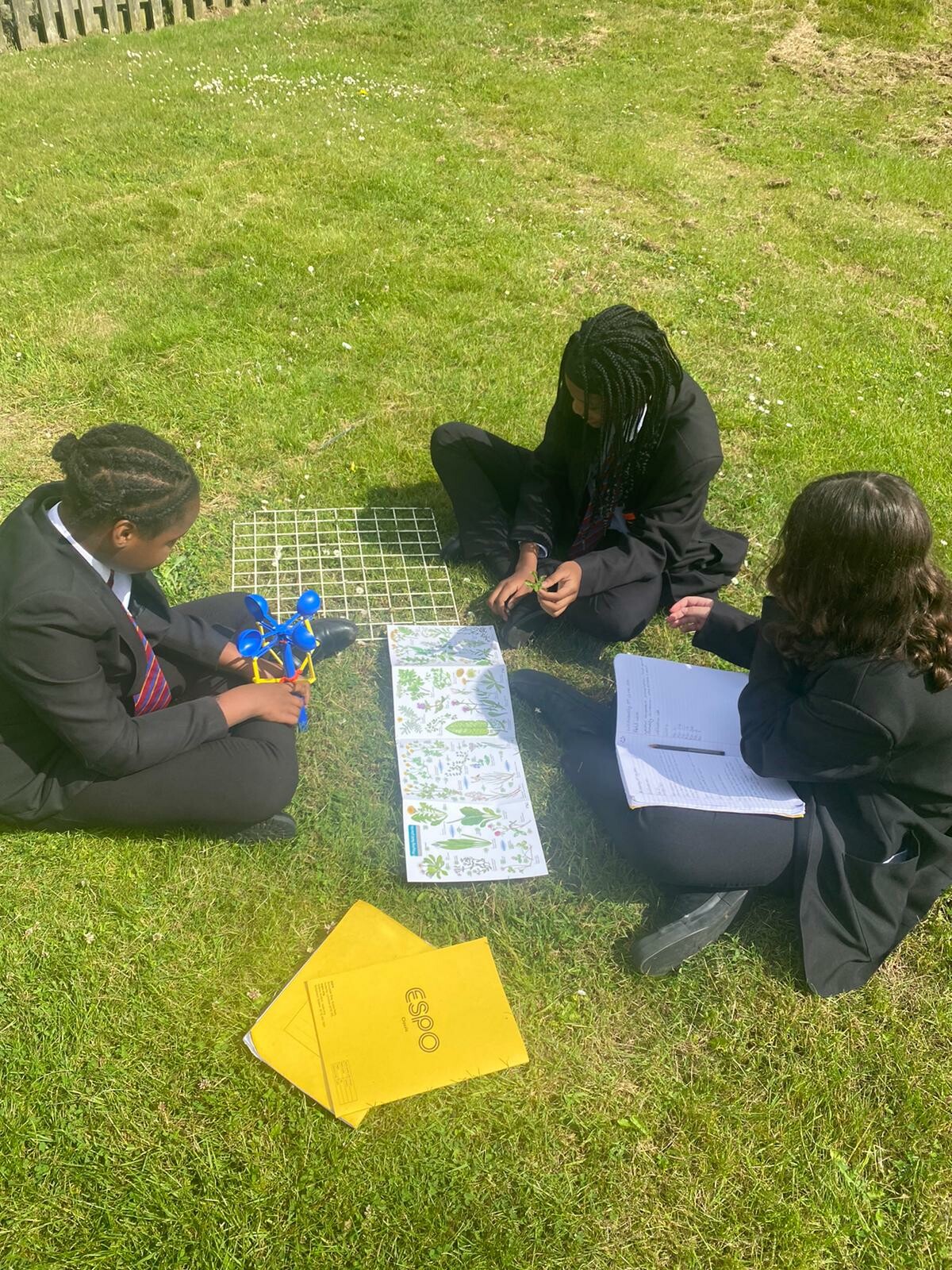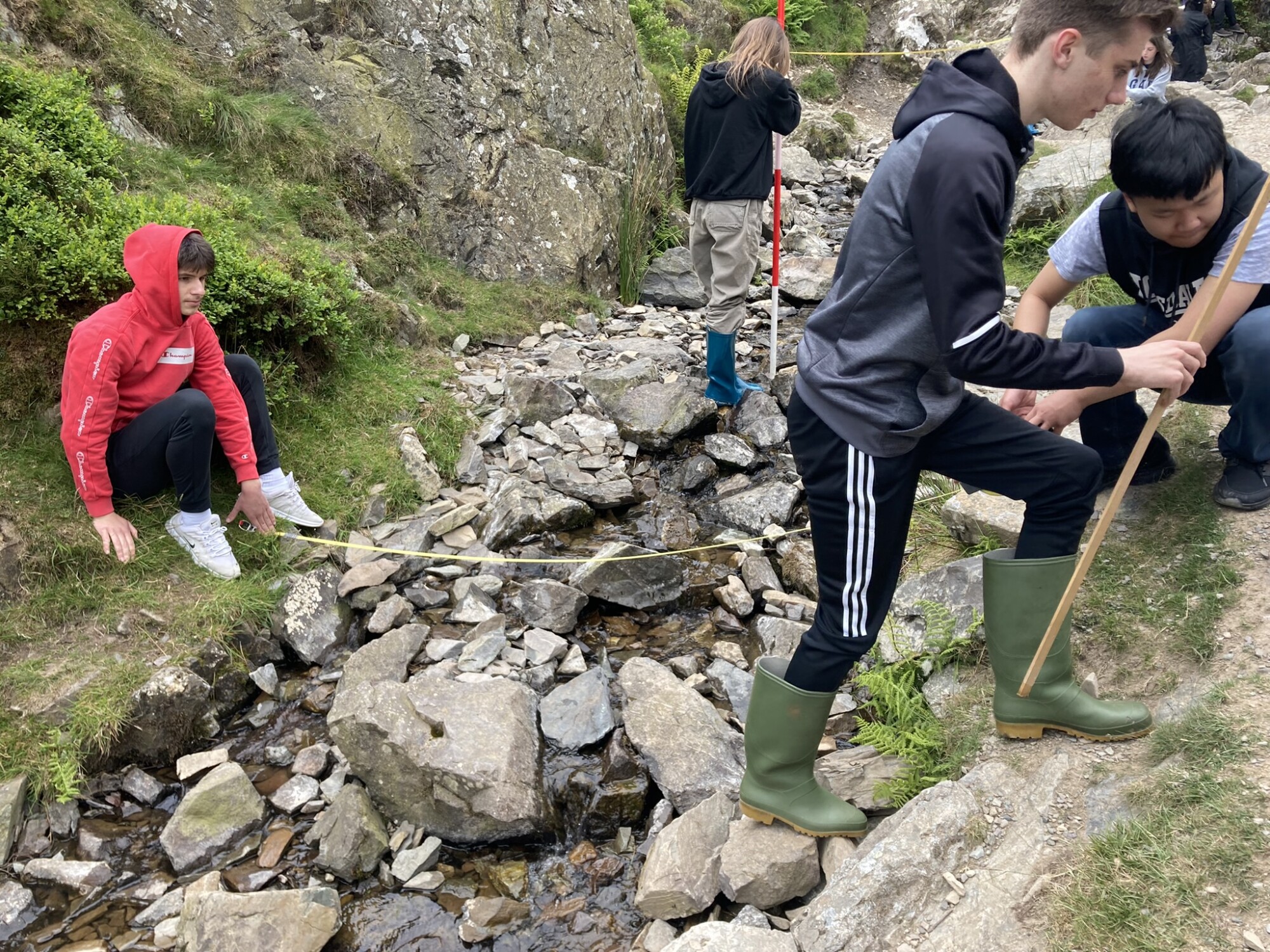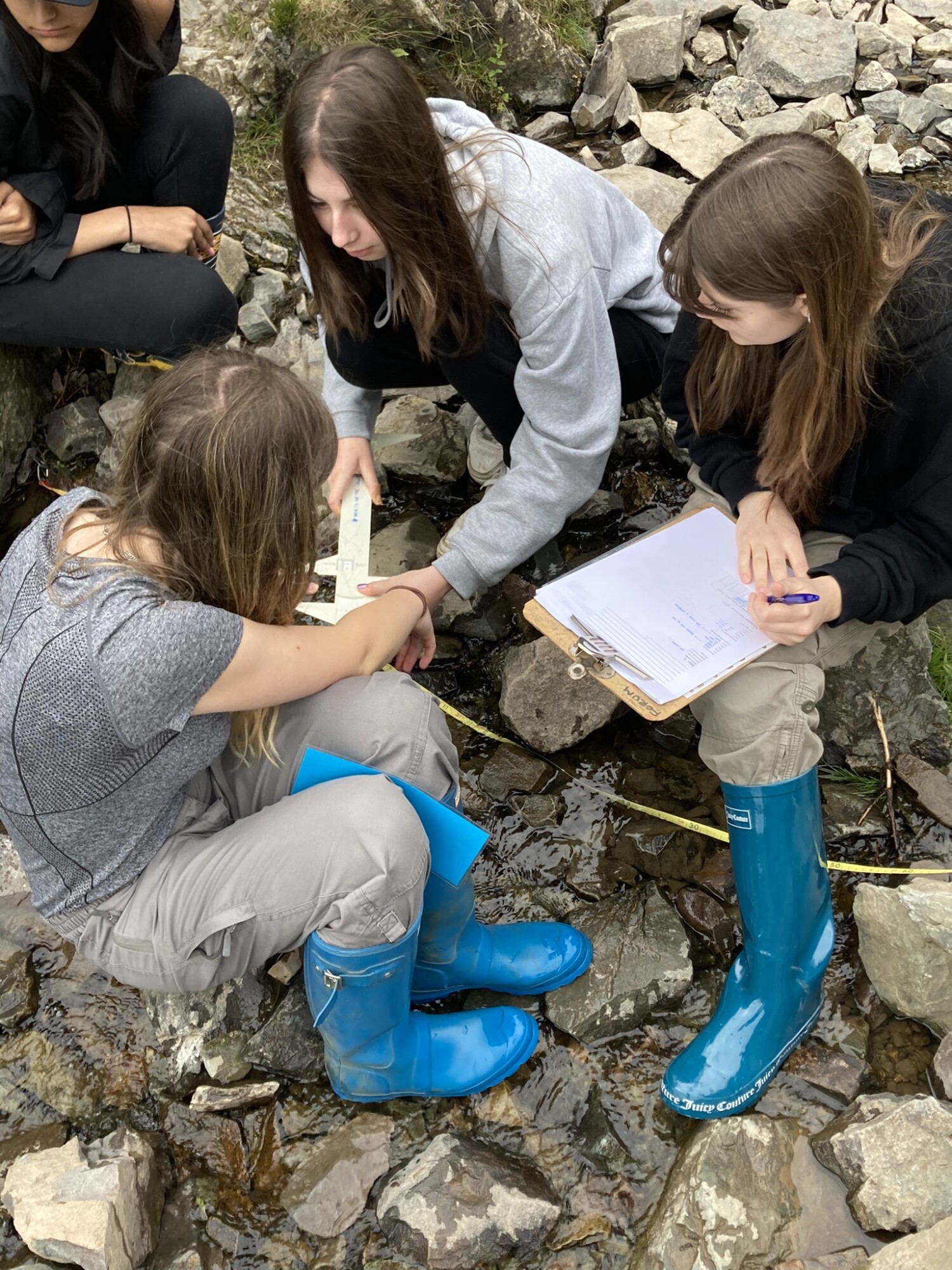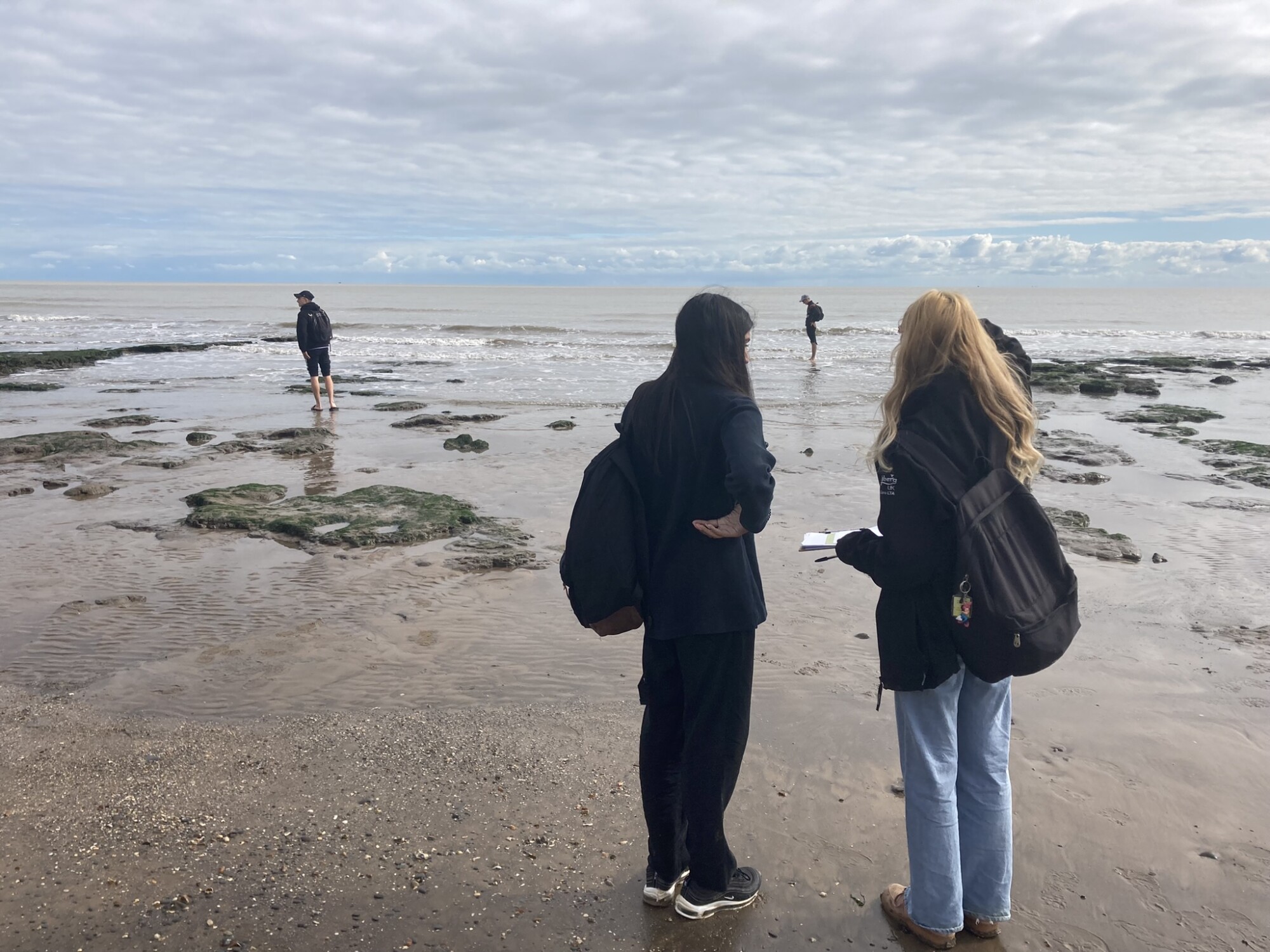Geography
Faculty Introduction:
Through our rich and varied geographical journey we hope that as many students as possible continue their study of Geography into Key Stages 4 and 5.
We will explore culture, be creative and inspire curiosity through our studies of the world, its landforms and its people. Our curriculum is broad, balanced and inclusive paving the way for students to be confident in their own voice as well as understanding the voices of others.
Our geography curriculum provides opportunities for students to further their experiences of the world through extra and super curricular activities, providing them with character and currency alongside developing their leadership and employability skills.
By teaching through a de-colonising and anti-racist lens we want students to understand their world and not only relate to their local community but to our national and global communities. Students will be exposed to more than the single story and understand the danger of only seeing one view of a location.
Through our golden threads of sustainability, systems and processes, development, interdependence, inequality, globalisation, biodiversity and resilience students will be exposed to a rich, diverse and challenging curriculum which underpins their knowledge of other areas of the curriculum. After all, without Geography you are nowhere.
We aim to prepare students for the world of tomorrow, creating global citizens who feel empowered to live sustainably and protect the future as well as to dream big and aspire to travel and discover our beautiful planet.
Our key objectives
Our three key objectives are:
1. To help students to develop their geographical knowledge and understanding.
2. To introduce students to geographical enquiry and develop problem-solving and investigative skills.
3. To help students develop a sense of identity through learning about the UK and other countries and the relationships between them which will help them to develop their own informed opinions and attitudes.
Topics / Modules to be covered:
- Becoming a geographer
- The Almighty Dollar
- Wicked Weather
- Hot Deserts
- Vicious Volcanoes
In all our Geography courses there is a strong emphasis on fieldwork and skills, both close to home and further afield. We feel that fieldwork opportunities are an essential part of a student’s geographical education.
Assessment:
Students will be assessed through three main assessments throughout the year, with smaller, informal tests during each term.
Homework:
Homework is set every other week and students are usually given one week to complete it. It is marked in agreement with the school’s feedback policy.
In addition, some of the topic areas provide opportunities for longer homework projects to be set and often involves making models or completing practical activities over the space of the half term.
Enhancement & Enrichment Activities:
- Geography club
- British Council school partnership activities with our overseas partner schools in Pakistan, Bangladesh and Taiwan
- Antarctic Flags Project with the UK Polar Network
- Local fieldwork
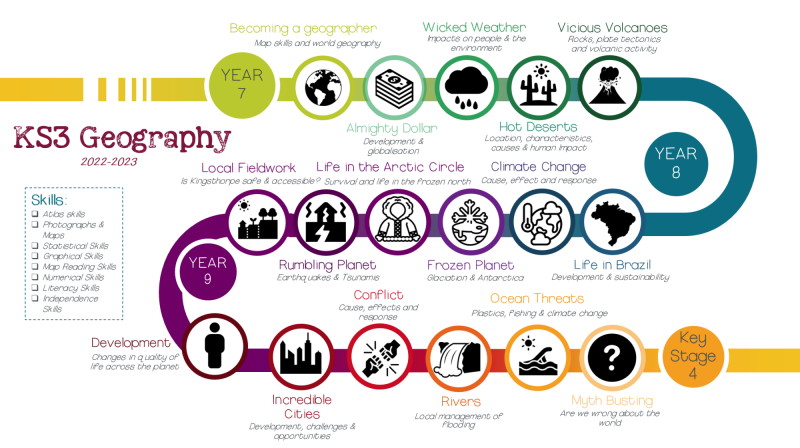
KS3 Geography
Faculty Introduction:
Through our rich and varied geographical journey we hope that as many students as possible continue their study of Geography into Key Stages 4 and 5.
We will explore culture, be creative and inspire curiosity through our studies of the world, its landforms and its people. Our curriculum is broad, balanced and inclusive paving the way for students to be confident in their own voice as well as understanding the voices of others.
Our geography curriculum provides opportunities for students to further their experiences of the world through extra and super curricular activities, providing them with character and currency alongside developing their leadership and employability skills.
By teaching through a de-colonising and anti-racist lens we want students to understand their world and not only relate to their local community but to our national and global communities. Students will be exposed to more than the single story and understand the danger of only seeing one view of a location.
Through our golden threads of sustainability, systems and processes, development, interdependence, inequality, globalisation, biodiversity and resilience students will be exposed to a rich, diverse and challenging curriculum which underpins their knowledge of other areas of the curriculum. After all, without Geography you are nowhere.
We aim to prepare students for the world of tomorrow, creating global citizens who feel empowered to live sustainably and protect the future as well as to dream big and aspire to travel and discover our beautiful planet.
Our key objectives
Our three key objectives are:
1. To help students to develop their geographical knowledge and understanding.
2. To introduce students to geographical enquiry and develop problem-solving and investigative skills.
3. To help students develop a sense of identity through learning about the UK and other countries and the relationships between them which will help them to develop their own informed opinions and attitudes.
Topics / Modules to be covered:
- Brazil
- Climate Change
- Frozen Planet
- Life in the Arctic Circle
- Our rumbling planet
- Local fieldwork
In all our Geography courses there is a strong emphasis on fieldwork, both close to home and further afield. We feel that fieldwork opportunities are an essential part of a student’s geographical education.
Assessment:
Students will be assessed through three main assessments throughout the year, with smaller, informal tests during each term.
Homework:
Homework is set every other week and students are usually given one week to complete it. It is marked in agreement with the school’s feedback policy.
In addition, some of the topic areas provide opportunities for longer homework projects to be set and often involves making models or completing practical activities over the space of the half term.
Enhancement & Enrichment Activities:
- Trip to the living rainforest
- Geography club
- British Council school partnership activities with our overseas partner schools in Pakistan, Bangladesh and Taiwan
- Antarctic Flags Project with the UK Polar Network
- Local fieldwork
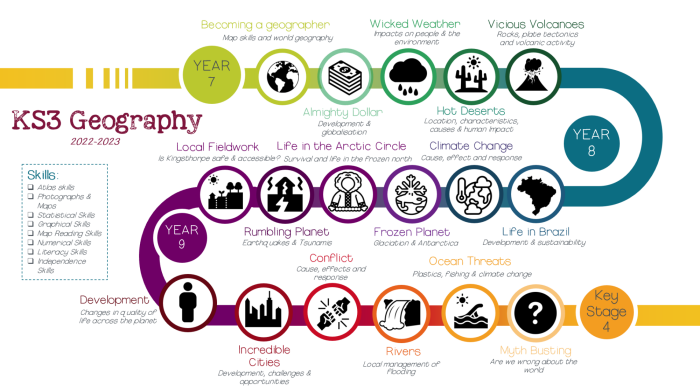
KS3 Geography
Faculty Introduction:
Through our rich and varied geographical journey we hope that as many students as possible continue their study of Geography into Key Stages 4 and 5.
We will explore culture, be creative and inspire curiosity through our studies of the world, its landforms and its people. Our curriculum is broad, balanced and inclusive paving the way for students to be confident in their own voice as well as understanding the voices of others.
Our geography curriculum provides opportunities for students to further their experiences of the world through extra and super curricular activities, providing them with character and currency alongside developing their leadership and employability skills.
By teaching through a de-colonising and anti-racist lens we want students to understand their world and not only relate to their local community but to our national and global communities. Students will be exposed to more than the single story and understand the danger of only seeing one view of a location.
Through our golden threads of sustainability, systems and processes, development, interdependence, inequality, globalisation, biodiversity and resilience students will be exposed to a rich, diverse and challenging curriculum which underpins their knowledge of other areas of the curriculum. After all, without Geography you are nowhere.
We aim to prepare students for the world of tomorrow, creating global citizens who feel empowered to live sustainably and protect the future as well as to dream big and aspire to travel and discover our beautiful planet.
Our key objectives
Our three key objectives are:
1. To help students to develop their geographical knowledge and understanding.
2. To introduce students to geographical enquiry and develop problem-solving and investigative skills.
3. To help students develop a sense of identity through learning about the UK and other countries and the relationships between them which will help them to develop their own informed opinions and attitudes.
Topics / Modules to be covered:
- Development
- Incredible Cities
- Conflict
- Rivers
- Oceans under threat
- Myth-busting
In all our Geography courses there is a strong emphasis on fieldwork, both close to home and further afield. We feel that fieldwork opportunities are an essential part of a student’s geographical education.
Assessment:
Students will be assessed through three main assessments throughout the year, with smaller, informal tests during each term.
Homework:
Homework is set every other week and students are usually given one week to complete it. It is marked in agreement with the school’s feedback policy.
In addition, some of the topic areas provide opportunities for longer homework projects to be set and often involves making models or completing practical activities over the space of the half term.
Enhancement & Enrichment Activities:
- Geography club
- British Council school partnership activities with our overseas partner schools in Pakistan, Bangladesh and Taiwan
- Antarctic Flags Project with the UK Polar Network
- Local fieldwork and possible trip to the Natural History Museum

KS3 Geography
Faculty Introduction:
Through our rich and varied geographical journey we hope that as many students as possible continue their study of Geography into Key Stages 4 and 5.
We will explore culture, be creative and inspire curiosity through our studies of the world, its landforms and its people. Our curriculum is broad, balanced and inclusive paving the way for students to be confident in their own voice as well as understanding the voices of others.
Our geography curriculum provides opportunities for students to further their experiences of the world through extra and super curricular activities, providing them with character and currency alongside developing their leadership and employability skills.
By teaching through a de-colonising and anti-racist lens we want students to understand their world and not only relate to their local community but to our national and global communities. Students will be exposed to more than the single story and understand the danger of only seeing one view of a location.
Through our golden threads of sustainability, systems and processes, development, interdependence, inequality, globalisation, biodiversity and resilience students will be exposed to a rich, diverse and challenging curriculum which underpins their knowledge of other areas of the curriculum. After all, without Geography you are nowhere.
We aim to prepare students for the world of tomorrow, creating global citizens who feel empowered to live sustainably and protect the future as well as to dream big and aspire to travel and discover our beautiful planet.
Our key objectives
Our three key objectives are:
1. To help students to develop their geographical knowledge and understanding.
2. To introduce students to geographical enquiry and develop problem-solving and investigative skills.
3. To help students develop a sense of identity through learning about the UK and other countries and the relationships between them which will help them to develop their own informed opinions and attitudes.
Geography is a flexible subject about the real world outside the classroom. It integrates many other subject areas such as Biology, Sociology, Economics, History, English, Maths, Physics, Chemistry and Information Technology. Geography assists the development of many job relevant skills and it is also a "living" subject happening everywhere, and a successful medium for investigating the past, present and future. Geography can lead to a wide and varied number of careers and broaden your understanding of the world, its environments and its peoples.
Topics / Modules to be covered:
How will I be taught?
Students are taught in mixed ability groups. They receive 6 lessons over two weeks. Homework is set up to twice a week from a variety of tasks including research, extended writing and geographical skills.
What will I study?
At GCSE students follow the Eduqas B Specification. The course consists of the following units:
Theme 1: Changing places, changing economies
- This unit covers inequalities in urban areas, changes to the urban environment, the interaction between urban and rural areas and global development.
Theme 2: Changing Environments
- This unit covers rivers, weather and climate, coasts and the global issue of climate change.
Theme 3: Environmental Challenges
- This unit covers ecosystems, water resources and desertification.
In all our Geography courses there is a strong emphasis on fieldwork, both close to home and further afield. We feel that fieldwork opportunities are an essential part of a student’s geographical education.
Assessment:
- Paper 1: Investigating Geographical Issues (1 hour 45 minutes).
- Paper 2: Problem Solving Geography (1 hour 30 minutes)
- Paper 3: Applied fieldwork enquiry (1 hour 30 minutes)
Homework:
Homework is set twice a week and it is marked in agreement with the school’s feedback policy. It will often involve completion of past exam questions and papers. In addition, throughout both years, but particularly in Year 11, students will be given specific revision tasks.
Enhancement & Enrichment Activities:
Students are required to attend two field trips as an essential part of the course, in particular to their Component 3 exam. We organise a human geography and physical geography field work trip, which usually take place in the summer term of year 10. The trips are subject to change as the focus is set by the exam board every year, however, most recently we have visited Carding Mill Valley in Shropshire and Northampton Town Centre.
Faculty Introduction:
Through our rich and varied geographical journey we hope that as many students as possible continue their study of Geography into Key Stages 4 and 5.
We will explore culture, be creative and inspire curiosity through our studies of the world, its landforms and its people. Our curriculum is broad, balanced and inclusive paving the way for students to be confident in their own voice as well as understanding the voices of others.
Our geography curriculum provides opportunities for students to further their experiences of the world through extra and super curricular activities, providing them with character and currency alongside developing their leadership and employability skills.
By teaching through a de-colonising and anti-racist lens we want students to understand their world and not only relate to their local community but to our national and global communities. Students will be exposed to more than the single story and understand the danger of only seeing one view of a location.
Through our golden threads of sustainability, systems and processes, development, interdependence, inequality, globalisation, biodiversity and resilience students will be exposed to a rich, diverse and challenging curriculum which underpins their knowledge of other areas of the curriculum. After all, without Geography you are nowhere.
We aim to prepare students for the world of tomorrow, creating global citizens who feel empowered to live sustainably and protect the future as well as to dream big and aspire to travel and discover our beautiful planet.
Our key objectives
Our three key objectives are:
1. To help students to develop their geographical knowledge and understanding.
2. To introduce students to geographical enquiry and develop problem-solving and investigative skills.
3. To help students develop a sense of identity through learning about the UK and other countries and the relationships between them which will help them to develop their own informed opinions and attitudes.
Geography is a flexible subject about the real world outside the classroom. It integrates many other subject areas such as Biology, Sociology, Economics, History, English, Maths, Physics, Chemistry and Information Technology. Geography assists the development of many job relevant skills and it is also a "living" subject happening everywhere, and a successful medium for investigating the past, present and future. Geography can lead to a wide and varied number of careers and broaden your understanding of the world, its environments and its peoples.
Topics / Modules to be covered:
Our students follow the AQA Specification, which builds on previous experience but also has a progressive and contemporary edge that builds students’ knowledge and understanding whilst also providing them with essential skills regardless of their future pathways.
The course consists of the following units:
Year 12
- Water and carbon cycles
- Coastal environments
- Population and the environment
- Changing places
Students will also begin their preparation for their NEA coursework. Students will then attend four days of fieldwork in a variety of locations including Stratford and Brick Lane in London, and Walton on the Naze. During the NEA process students will research and write their own fieldwork investigation based on an area of interest within the specification.
Year 13
- Global systems and global governance.
- Hazards
In all our Geography courses there is a strong emphasis on fieldwork, both close to home and further afield. We feel that fieldwork opportunities are an essential part of a student’s geographical education.
Assessment:
- Paper 1: Physical Geography (2 hours 30 min exam)
- Paper 2: Human Geography (2 hours 30 min exam)
- NEA fieldwork investigation
Homework:
Homework is set once a week by each teacher and it is marked in agreement with the school’s feedback policy. It will often involve completion of past exam questions and papers. In addition, revision tasks will also be set.
Enhancement & Enrichment Activities:
- RGS student conferences on A Level topics
- Hodder student conference on Hazards
- Workshops with the University of Northampton
- The Geological Society Competition
GCSE Geography exam
This page has been put together to give you an electronic link to all the Case Studies you will need for your GCSE Geography exam at the end of Year 11.

